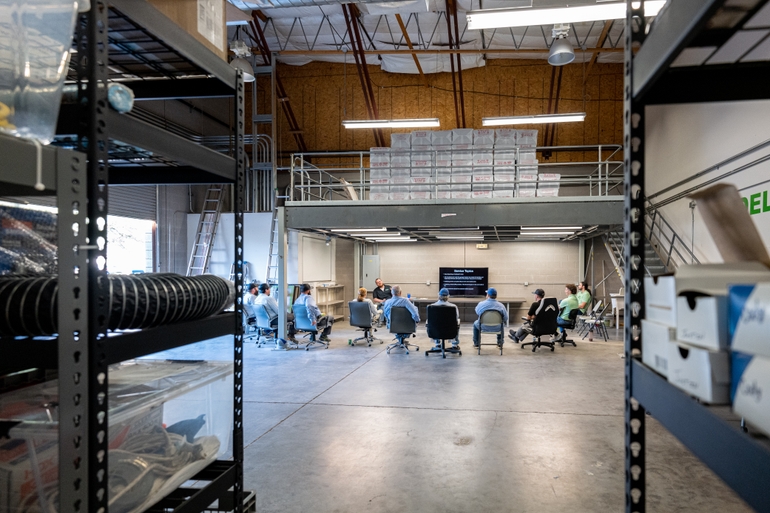Pest Control Employee Training Guide (Increased Success Rate)

When a homeowner or commercial property manager hires a pest service to eliminate bed bugs or tackle a termite infestation, they expect skilled professionals with the proper training to eradicate the problem.
As the owner of a pest control service, it’s your responsibility to ensure new employees possess the knowledge to solve common pest problems and provide ongoing training to help employees grow their skills and leverage the latest field management software.
Read on to learn key strategies for designing a pest control training program. We’ll also examine how pest control software helps businesses eliminate manual processes and streamline staff training.
Assess Training Needs for Your Pest Control Business
Before you create a detailed training program specific to your unique pest control business, it’s essential to identify current training needs, recognize gaps in skill sets, and understand regulatory requirements that impact your business. Taking a strategic approach to training can help all employees level up their skills, ultimately contributing to the business's success.
Identifying key skill sets
The first step to assessing your training needs involves taking stock of employee skills, or lack thereof. Ideally, staff members should have a strong understanding of integrated pest management (IPM), know how to safely handle pesticides, wear protective equipment, and accurately identify signs of pest infestation.
Depending on your business, you may need employees with advanced knowledge of how pest control affects food safety and processing or hold specialized credentials, such as certified entomologists. In some instances, employees may need degrees in pest biology.
Methods for evaluating employee skills include issuing surveys and questionnaires, performing practical assessments that require employees to demonstrate skills in real-world scenarios, and documenting employee licensing and certifications.
Analyzing regulatory requirements
Commercial pest control services must adhere to state and federal laws for handling pesticides and chemical treatments. Research all applicable laws and ensure your field technicians and applicators obtain the necessary licensing for where you operate your business. Most states issue pest control licensing through the Department of Agriculture or Office of the State Chemist.
Develop a Comprehensive Training Program
Your training program should be specific to your unique pest control business. Employee training should include hands-on instruction and classroom training. Technicians should have a broad knowledge of identifying pest activity, prevention, and practical mitigation techniques.
Structuring training modules
As you design training modules for your pest control program, you want to ensure the information is easy for employees to comprehend and retain. Covering too much information at once can overwhelm employees, so break down training modules into shorter, digestible segments.
It’s also important to consider training from a relevance and progression standpoint. Start with more basic concepts, such as pest identification and recognizing common pest issues, then move on to more complex topics, like designing an IPM program.
Integrating technology in training
Integrating technology into your training modules can help employees retain knowledge faster, making the training more engaging than reading a book. Examples of technology can include using virtual simulations to identify cockroaches and other pests, online quizzes and checklists, and mobile applications for hands-on training in the field.
Customize Training for Different Roles
The key to a successful training program involves customizing training modules to the specific job title or role. While pest control applicators need to know how to measure and apply pesticides correctly, your office staff or accounting team likely don’t require the same skills.
On the other hand, some roles can benefit from cross training. For example, consider training your field technicians on upsell and other sales techniques so they can confidently pitch additional services to customers while at the job site.
By customizing training to the specific role, management teams can help employees perform to the best of their abilities while contributing to the business's overall success.
Monitor and Evaluate Training Effectiveness
The best way to understand if your training efforts are genuinely helping employees is to measure the key performance indicators that matter the most to your organization.
KPIs for measuring the success of pest control training can include successful pest identification rates, safety compliance (or lack of), and customer satisfaction scores. Pest control software makes it easy to collect technician reviews by automatically sending a review prompt after each job.
Make sure to communicate with your staff how you plan to measure their performance and be open about setting benchmarks and methods to collect quantitative feedback.
If you notice employees fail to grasp specific topics or consistently make the same mistakes repeatedly, you need to re-evaluate your training plan.
Finally, if you experience high employee turnover, you likely need to change up your training program. Providing employees with ongoing training and mentorship proves successful in retaining high-quality employees.
Train Your Pest Control Employees to Use the Latest Technology
A comprehensive pest control employee training program should include a range of strategies and training modules, including hands-on training and classroom instruction, regulatory compliance and safety procedures, customer service, and ongoing mentorship and support.
Adding pest control software takes technician training to the next level. With the FieldRoutes® Mobile app, techs can easily access their daily schedules, review customer notes and service history, track inventory, create professional quotes, and offer financing at the job site.
Learn more about how FieldRoutes helps pest control companies simplify business management by scheduling a free demo of the FieldRoutes Operations Suite.
Frequently Asked Questions (FAQs)
1. What are the most effective training methods for new pest control technicians?
The most effective training methods for new pest control technicians include on-the-job training, hands-on practical exercises, shadowing veteran techs, and regular mentoring and coaching.
2. What are the key elements of effective training for pest control technicians?
The key elements of effective training for pest control technicians include pest identification, regulatory compliance, safety procedures, customer service, quality assurance, and technology adoption.
3. What are the best practices for training new pest control technicians?
Some best practices for training new pest control employees include offering hands-on training experiences, mentorship and career guidance, safety training, and a comprehensive program to teach integrated pest management practices.
4. What certifications are required for pest control employees?
Certifications and training vary depending on the state. The most common certification for pest control technicians is the commercial pesticide applicator license.






